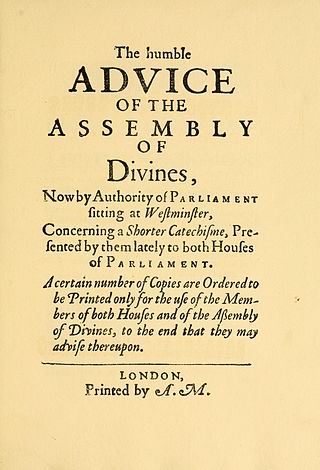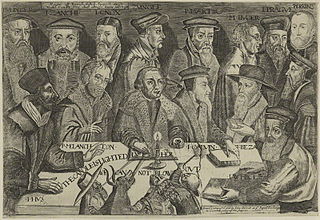
A creed, also known as a confession of faith, a symbol, or a statement of faith, is a statement of the shared beliefs of a community in a form which is structured by subjects which summarize its core tenets.

Presbyterianism is a Reformed (Calvinist) Protestant tradition named for its form of church government by representative assemblies of elders. Though there are other Reformed churches that are structurally similar, the word Presbyterian is applied to churches that trace their roots to the Church of Scotland or to English Dissenter groups that formed during the English Civil War.

The Westminster Confession of Faith, or simply the Westminster Confession, is a Reformed confession of faith. Drawn up by the 1646 Westminster Assembly as part of the Westminster Standards to be a confession of the Church of England, it became and remains the "subordinate standard" of doctrine in the Church of Scotland and has been influential within Presbyterian churches worldwide.

The Westminster Shorter Catechism is a catechism written in 1646 and 1647 by the Westminster Assembly, a synod of English and Scottish theologians and laymen intended to bring the Church of England into greater conformity with the Church of Scotland. The assembly also produced the Westminster Confession of Faith and the Westminster Larger Catechism. A version without Scripture citations was completed on 25 November 1647 and presented to the Long Parliament, and Scripture citations were added on 14 April 1649.
The Confession of Faith (1689), also known as the 1689 Baptist Confession of Faith, or the Second London Baptist Confession of Faith, is a Particular Baptist confession of faith. It was written by English Baptists who subscribed to a Calvinistic soteriology as well as to a covenantal systematic theology. Because it was adopted by the Philadelphia Association of Baptist Churches in the 18th century, it is also known as the Philadelphia Confession of Faith. The Philadelphia Confession, however, was a modification of the Second London Confession; it added an allowance for the singing of hymns, psalms, and spiritual songs in the Lord's Supper and made optional the laying on of hands in baptism.

The Westminster Assembly of Divines was a council of divines (theologians) and members of the English Parliament appointed from 1643 to 1653 to restructure the Church of England. Several Scots also attended, and the Assembly's work was adopted by the Church of Scotland. As many as 121 ministers were called to the Assembly, with nineteen others added later to replace those who did not attend or could no longer attend. It produced a new Form of Church Government, a Confession of Faith or statement of belief, two catechisms or manuals for religious instruction, and a liturgical manual, the Directory for Public Worship, for the Churches of England and Scotland. The Confession and catechisms were adopted as doctrinal standards in the Church of Scotland and other Presbyterian churches, where they remain normative. Amended versions of the Confession were also adopted in Congregational and Baptist churches in England and New England in the seventeenth and eighteenth centuries. The Confession became influential throughout the English-speaking world, but especially in American Protestant theology.

The Presbyterian Church in the United States of America (PCUSA) was a Presbyterian denomination existing from 1789 to 1958. In that year, the PCUSA merged with the United Presbyterian Church of North America. The new church was named the United Presbyterian Church in the United States of America. It was a predecessor to the contemporary Presbyterian Church (USA).

The reformed confessions of faith are the confessional documents of various Reformed churches. These express the doctrinal views of the churches adopting the confession. Confessions play a crucial part in the theological identity of reformed churches, either as standards to which ministers must subscribe, or more generally as accurate descriptions of their faith. Most confessions date to the 16th and 17th century.

The Westminster Standards is a collective name for the documents drawn up by the Westminster Assembly (1643–1649). These include the Westminster Confession of Faith, the Westminster Shorter Catechism, the Westminster Larger Catechism, the Directory of Public Worship, and the Form of Church Government, and represent the doctrine and church polity of 17th century English and Scottish Presbyterianism. The Westminster Confession of Faith and Larger and Shorter Catechism have been adopted as doctrinal standards by a number of Reformed and Presbyterian Christian denominations, but not the Church of Scotland nor those derived directly from it.

The Reformed Presbyterian Church General Assembly (RPCGA) is a Presbyterian church body and conservative denomination in the United States established in 1991. The RPCGA was founded by members of the Reformed Presbyterian Church in the United States.

The Directory for Public Worship is a liturgical manual produced by the Westminster Assembly in 1644 to replace the Book of Common Prayer. Approved by the Parliament of England in 1644 and the Parliament of Scotland in 1645, the Directory is part of the Westminster Standards, together with the Westminster Confession of Faith, the Westminster Shorter Catechism, the Westminster Larger Catechism, and the Form of Church Government.

The Presbyterian Church of Victoria is one of the constituent churches of the Presbyterian Church of Australia. It was established in 1859 as a union of Church of Scotland, Free Presbyterian and United Presbyterian congregations.
The Westminster Presbyterian Church in the United States (WPCUS) was a Presbyterian denomination, founded in United States in 2006, by Rev. Brian Schwertley, formerly affiliated with Covenant Reformed Presbyterian Church and other pastors formerly affiliated with other Presbyterian denominations. The founders were particularly concerned with the perceived spread of liberal teaching within Presbyterianism in the United States and in particular with Federal Vision theology, which they believe supplies a different understanding of doctrines such as justification and the perseverance of the saints.

Reformed Christianity originated with the Reformation in Switzerland when Huldrych Zwingli began preaching what would become the first form of the Reformed doctrine in Zürich in 1519.
The Reformed Presbyterian Church - Hanover Presbytery is a very conservative Protestant, Presbyterian denomination, founded in 1991, with congregations in United States and also in Brazil.

Presbyterianism has had a presence in the United States since colonial times and has exerted an important influence over broader American religion and culture.
The Adopting Act of 1729 was an act of the Synod of Philadelphia that made the Westminster Standards, particularly the Westminster Confession of Faith, the official confessional statements for Presbyterian churches in colonial America. Presbyterian ministers were required to believe or "subscribe" to the "essential and necessary" parts of the standards, but defining what was essential and necessary was left to individual presbyteries to determine.
The Covenant Reformed Presbyterian Church (CRPC) is a Presbyterian denomination, formed in 1997, by churches from various other denominations.

The Presbyterian Reformed Church in India (PRCI) is a Presbyterian denomination, established in South India, in 2015, as a result of the missionary work of the Presbyterian Church of Brazil in Goa, Maharashtra and Chhattisgarh.
In confessional churches, office-bearers are required to "subscribe" to the church's confession of faith. In Presbyterian denominations, this is the Westminster Confession of Faith, while in Confessional Lutheranism it is the Book of Concord. The degree to which subscribers are required to agree with the confession varies from denomination to denomination.











